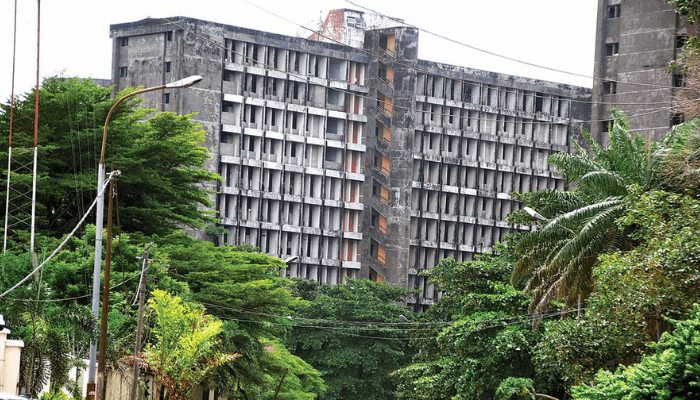Of all the properties abandoned in Lagos by the federal government, the Federal Secretariat Complex Ikoyi stands out as a national monument wasting away in the midst of scarcity and want.
The present state of the 12-story complex, built in 1976 and abandoned since December 1991 when the federal capital was moved from Lagos to Abuja, is a huge source of worry to Nigerians who see many other uses and purposes the complex can serve.
As a former governor of the state who has been a strong advocate of special status for Lagos, and also as one who knows the social and economic needs of the state, all eyes are now on Bola Tinubu, as president of Nigeria, to end the rot in the secretariat complex by ending the legal tussle clogging its redevelopment and optimal use.
Housing sector stakeholders see the continued waste of the complex as a huge economic and revenue loss, explaining that millions of naira is lost daily from what could have served as a source of revenue if it had been rented out to investors.
According to them, apart from the revenue loss, the continued waste of that complex and others like it in the city rub off on Nigeria’s housing deficit, which is well over 20 million units, noting that Lagos as the country’s economic capital has about 3 million housing units deficit with about 80 percent of its 20 million population living in rented accommodation.
Other wasting government assets in Lagos alone include the Nigerian External Telecommunications (NET) building in Marina, the Defence House (formerly Independence Building) and the former Navy Headquarters building in Marina. Their neglect, according to estate valuers, robs cash-strapped Nigeria of over N3.5 billion in potential annual revenue.
“It would be an advantage to Nigerians if the custodians of the old federal secretariat look inwards and proffer creative ways the building can be transformed either for commercial or residential purposes,” Udo Okonjo, CEO, Fine and Country, noted in a chat with BusinessDay, citing St Pancras Renaissance Hotel and Liverpool’s grade ll listed Gladstone Conservatory that have been so converted.
According to the realtor, the secretariat complex could be converted to mixed use developments or work live and play. “It can also be used as a co-work space, multi-studio apartments. Alternatively, it can be used as retail spaces to reduce the 2.7 million space deficit across the nation,” she advised.
Read also: Lagos to close down night clubs over drugs, firearms
Besides the revenue and residential accommodation loss, the value of the complex, which sits on prime land in a prime location, continues to depreciate. BusinessDay checks reveal that the value of that asset, including the land and the physical structure, is estimated at N40 billion.
“That asset is standing on prime land; don’t forget that it is in Ikoyi, which is one of the most expensive, if not the most expensive, locations in Nigeria,” an estate surveyor and valuer who pleaded anonymity told BusinessDay in an interview.
“A lot of things are very difficult to understand in this country,” Debo Ajani, an estate manager who spoke with BusinessDay, said. He was also worried that a national asset like that secretariat was allowed to waste away and lose its value on a daily basis because of parochial interests.
“I am still in doubt if it is really the Lagos State government that is holding down the redevelopment of that facility into residential apartments to provide homes for the residents of the state,” he wondered.
He noted that with a housing deficit estimated at 3 million units and the determination to provide housing for the residents through a partnership with the private sector, the Lagos State government should be encouraging the redevelopment of that complex and not stalling it.
It would be recalled that, along with the 1004 Flats Estate in Victoria Island, Lagos, the federal secretariat complex was among the few federal government properties sold to members of the public by the Olusegun Obasanjo administration in 2006.
But unlike the 1004 Flats Estate, the federal secretariat has been in contention between the Lagos State government and Resort International Limited (RIL), which acquired the property when it was sold.
Authorities of RIL said it made an investment of N7 billion intent on redeveloping the complex into apartment units that would have accommodated 480 families. This means that with an average of five persons per family, the complex would have provided homes for about 2,400 Nigerians.
The idea of redeveloping the complex, it was learned, didn’t go down well with the Lagos State government, which opposed the idea of converting it into a residential building and so obtained a court injunction, barring anyone from doing anything with the complex.
Wale Babalakin, chairman of Bi-Courtney Group, the parent company of RIL, explained that “after we came up with our own idea of converting the place to apartments, interests began to filter in and these interests were negative ones.”
“We paid N7 billion for the property in 2005. We moved to the site around December 2015. We had completed the design, prepared the buildings totally, and removed all partitions for construction before the interests came,’’ Babalakin added.
READ ALSO: Osun Govt Bans Monarch From Land Transaction
Source: https://businessday.ng/





